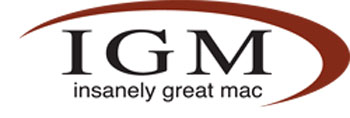Jobs' Five Years: Apple Up 87%
November 18th 2002
Think tech stocks are down? You're right. And wrong.
While the dot com bubble burst in 2000, tech stocks are still a lot healthier than they were five years ago. When Jobs took over Apple in 1997, Apple stock traded at around $12.
While the pre-stock split took Apple to a peak of well over $150 per share, the post-stock split and seen shares follow the peaks and troughs of the post-2000 market.
An article at Yahoo biz looks at how some tech stocks have performed over five years. While they're not at their heady peaks, they're performing respectably, according to data from market-research company Birinyi Associates, cited in the article.
Apple competitors, such as Dell and Microsoft, are up 198% and 74%, respectively. Even Amazon, long the target of nay-sayers, has produced a profit, and is up 400% on its late 1997 price.
Other tech firms, such as Intel, Sun Microsystems, Corning, Motorola, Hewlett-Packard, Gateway and JDS Uniphase, have experienced a decline in value over the same period
By comparison, industrial stocks haven't fared nearly as well over the same five-year period. Big-name firms, such as Coca-Cola, GM, Ford and Gillette have lost value over five years (Ford announced multi-billion losses this year, while GM has lost over $800 million).
Greenback strength was cited by one analyst as a key reason behind the fall of Xerox, among others, which have been uncompetitive when the US dollar has been strong. Coca Cola has also suffered because of this. However, a fall in the exchange rate (prompted, for example, by the US Fed easing interest rates) would give exporting firms more of an edge.
Apple is currently trading at $15.65, down 30¢.
Analysis: Despite outsourcing, Apple does suffer from the strong US dollar as well; the complaints even from NAFTA member Canada are often loud on Apple pricing. In Australia, Europe and New Zealand, high sales taxes - together with, in the Eurozone's case, the weakness of the Euro - has meant expensive Macs and competition from white box PC makers (and we don't just mean Dell). Take a look at second-hand Mac prices in the UK some time.
If you held stock in Apple during Amelio's last gasp in 1997, you wouldn't make much if you sold it today. Nevertheless, if you'd sold on the rise (or if you're a senior Apple executive), you've probably bought a boat or two on the profits.
Does this represent shareholder value? Not right now. Firms are paying pennies when they used to pay pounds on their dividends. But buying while Apple's relatively low (it will rise early January pre-MWSF) can't be too bad a risk, when it's a company with over $4 billion in cash and very little debt.
